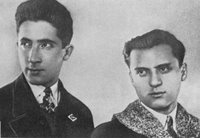
“La Vocation D’André Carel” directed by Herr Jean Choux it is a film from Switzerland… that bored, beautiful and neutral country, and this oeuvre it is in accordance with such a description.
The film depicts the story of André Carel (Stéphane Audel, inexpressive as a sphinx), son of a famous Parisian writer, who is sent to Montreaux together with his tutor, Herr Gaston Lebau (Herr Michel Simon in his debut in the screen). In order to mitigate that most famous illness which the high classes suffer, that is to say, laziness (from centuries the wealthy people went to Switzerland in order to cure those symptoms). While during a boat ride, André will meet a girl, becoming infatuated by her instantly. In order to succeed in attracting her, André becomes a boatman.
The most interesting aspects of this Swiss film are the beautiful landscapes showed superbly thanks to the cinematography by Herr Charles –Georges Duvanel and Herr Paul Guichard. The evocative and marine scenes at the Léman Lake focused on the boatmen’s hardships (an important statement about a way of living which has disappeared). Detailed are those different worlds where André is immersed - the idle and the working class.
Unfortunately the film doesn’t go deeply with those dramatic and interesting subjects (only succinctly). The director is satisfied depicting an anodyne and classic love story instead developing the drama implied in the film. That is not to mention the process of becoming aware of class-consciousness that André suffers. That’s the reason why “La Vocation D’André Carel” it is a bored, beautiful and neutral film.
And now, if you'll allow me, I must temporarily take my leave because this German Count wants to see the elegant Boat Race at the Schloss Lake.
Herr Graf Ferdinand Von Galitzien
-/-
“La Vocation D’André Carel”, filme dirigido por Herr Jean Choux, es un filme de nacionalidad suiza, ese aburrido, bello y neutral país y éste filme está en consonancia con dicha descripción germánica.
El filme narra la historia de André Carel ( Stéphane Andel, inexpresivo como una esfinge ), hijo de un famoso escritor parisino, que es enviado a Montreaux junto con su tutor, Herr Gaston Lebau ( Herr Michel Simon en su debut en el cine ) para ver si allí se le cura la famosa enfermedad que padecen las clases altas, esto es, la vagancia ( desde hace siglos, la gente con posibles ha viajado a Suiza para curar allí esos síntomas ); durante una travesía en un bote, André conocerá a una muchacha de la cual quedará prendado al instante; para intentar conquistarla, André se hará barquero.
Lo más destacado de éste filme suizo son sus bellos paisajes magníficamente retratados gracias a la fotografía de Herr Charles-Georges Duvanel y Herr Paul Guichard, evocativas y escenas marítimas en el lago Léman que se centran en las duras labores de los barqueros que allí trabajan ( un importante documento sobre una forma de vida ya desaparecida ), resaltando así los dos mundos diferentes en los cuales André se ve inmerso, la clase trabajadora y la ociosa.
Desafortunadamente el filme no profundiza, solamente sucintamente, con esos interesantes aspectos dramáticos del filme, quedando el director satisfecho contando una anodina y clásica historia de amor en vez de desarrollar el drama implícito en la obra, dejando de lado también el proceso de conciencia de clase que sufre André, siendo éstas las razones del porqué “La Vocation D’André Carel” es un aburrido, bello y neutral filme.
Y ahora si me lo permiten les tengo que dejar momentáneamente, pues este Conde germánico quiere presenciar la elegante regata de embarcaciones a celebrar en el lago del Schloss.
Herr Graf Ferdinand Von Galitzien







